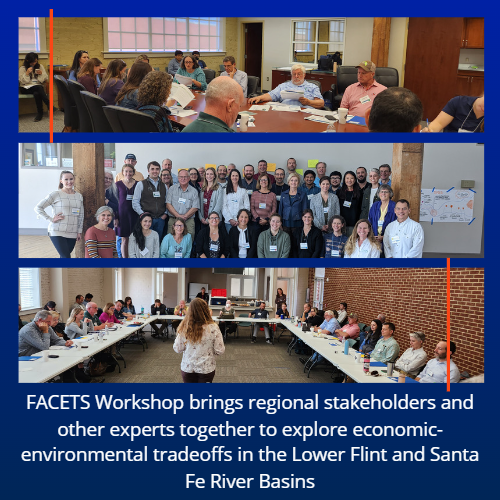FACETS Workshop brings regional stakeholders and other experts together to explore economic-environmental tradeoffs in the Lower Flint and Santa Fe River Basins
After three years of meeting online, last week regional stakeholders and other experts from Georgia and Florida universities met in person to explore economic-environmental tradeoffs among alternative climate, land use, technology, BMP adoption and policy scenarios in regions of N. Florida and S. Georgia overlying the Upper Floridan Aquifer.
Over the past five years modelers from the FACETS project have built a comprehensive modeling platform to predict farm/forest-scale and regional-scale impacts of alternative land use and production practices on the water quantity, water quality, and economy of N Florida and S Georgia. What makes this project unique is that these models integrate stakeholders’ experience with scientific data through a Participatory Modeling Process. Modelers and stakeholders from Florida and Georgia have co-developed and co- interpreted the models to explore economic-environmental tradeoffs among current and potential future climate, land use, technology, BMP adoption and policy scenarios. Through interpretation of these scenarios stakeholders collaboratively evaluated the changes needed to achieve economic sustainability of agriculture and forestry, and environmental protection, in the region.
Led by the Water Institute, the FACETS project is funded by the UDSA-NIFA and involves the participation of faculty, students and coordinators from University of Florida, University of Georgia, Auburn University and Albany State University. This workshop was hosted by the Georgia Water Planning and Policy Center in Albany, GA.
To learn more: https://floridanwater.research.ufl.edu/http://floridanwater.org/
December 13, 2022


